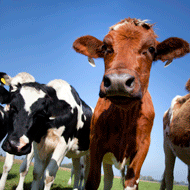Action Johne's release management plan

“International experience demonstrates that control and the reduction of Johne’s in dairy cattle is feasible and can be delivered cost effectively."
A draft national plan to target Johne's disease has been launched by The National Johne's Action Group (NJMP) for consultation.
Johne's disease is a chronic, progressive intestinal disease which is caused by infection with Mycobacterium avium subspecies paratuberculosis (MAP). Animals are usually infected as calves, with approximately 80 per cent of infection occurring within the first month of life. The calf can become infected whilst in the womb, by drinking infected colostrum and film, or by ingesting faeces.
The disease has a significant impact on the technical performance of the cow, affecting both productivity and fertility.
The NJMP plan aims to manage and then reduce the incidence of Johne's disease in dairy cattle, and engage 80 per cent of farmers in Great Britain in credible and robust Johne's management activities.
A framework for the plan was announced at the Johne's conference on November 18, 2014.
Commenting on the draft plan, Lyndon Edwards, chair of the Action Group on Johne’s, said:
“International experience demonstrates that control and the reduction of Johne’s in dairy cattle is feasible and can be delivered cost effectively. The UK needs to ensure that its performance in tackling the disease is comparable to its main international competitors.
“We have a responsibility as an industry to identify and use every tool available to reduce Johne’s in dairy cattle. We must focus on educating farmers, vets and farm advisors on the risks linked to the disease and develop a coherent and structured way to deal with it.
“We can make a real difference in tackling the disease. If we want a sustainable future for our industry we need to get a grip on Johne’s. A joint approach throughout the dairy industry is the right way to go and I’m confident that the National Johne’s Management Plan will deliver robust results and help us achieve a significant reduction of the disease.”
The draft management plan is open for consultation until January 18, with the objective of launching the plan from April next year.



 The Veterinary Medicines Directorate (VMD) is inviting applications from veterinary students to attend a one-week extramural studies (EMS) placement in July 2026.
The Veterinary Medicines Directorate (VMD) is inviting applications from veterinary students to attend a one-week extramural studies (EMS) placement in July 2026.